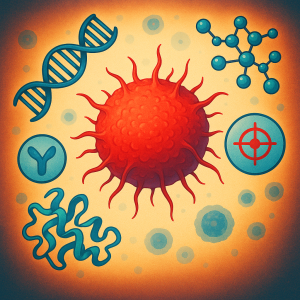
In the past two years, Czech cancer research has marked some notable successes. The NICR consortium had, within the scope of its Research Programme 1: ‘The molecular basis of cancer and molecular targets’, published a number of key studies which brought new insights into the mechanisms of origin of cancers and opened avenues to more effective therapies.
Mitochondria and the energy metabolism of tumours
One of the most important discoveries of the last year brought a better insight into the role of mitochondria in cancers. Mitochondria, often called ‘cell powerhouses’, turned out to be much more than just producers of energy. They are the key players in deciding whether a cell survives or dies.
Jiří Neužil’s team had shown that functional mitochondrial breathing is indispensable for the growth of glioblastomas. Especially fascinating is the finding that tumour cells can ‘borrow’ mitochondria from healthy cells using the Miro1 adaptor protein; this supplies them with energy needed for aggressive growth. Changes in the mitochondrial respiratory complex II in kidney cancer were then identified as new diagnostic markers and therapeutic goals.
Glioblastoma: A new hope for the most lethal brain tumour
Glioblastoma remains one of the deadliest types of cancer, but Czech research brought new findings which bring us closer to a possible effective treatment. The team of Aleksi Šedo and Jan Brábek found how the NAV3 protein regulates the invasive behaviour of tumour cells and how pericyte-like cells form ‘highways’ which facilitate the spread of the tumour. For clinical practice, they developed molecule-targeting probes, which could significantly improve the accuracy of neurosurgical procedures.
Childhood leukaemia: A more precise diagnostic prevents needless treatment
In the area of paediatric oncology, Jan Trka’s team has achieved significant progress in the diagnostic of minimal residual disease for acute lymphoblastic leukaemia. Their research had shown that a more accurate NGS method after bone marrow transplant spares children needless treatment. DNA-based genomic monitoring in acute childhood myeloid leukaemia enables doctors to follow the course of the disease with unprecedented precision.
Cellular mechanisms of life and death
Crucial discoveries pertained to cell death and transformation. TANK and AZI2 proteins protect against uncontrolled cell death, while PPM1D protein supports tumour transformation by preventing normal cellular ageing. Research had also shown how tumour cells ‘reprogram’ their glutamate metabolism to circumvent the effects of chemotherapy.
Metabolic reprogramming: How tumours change their ‘cooking’
Fascinating discoveries also revealed how tumour cells change their metabolism. Research had shown that a reprogramming of glutamate metabolism lowers the cytostatic effect of L-asparaginase, a drug used to treat leukaemia. Tumour cells thus seem capable of ‘readjusting their cooking’ so as to circumvent the effects of chemotherapy.
Similarly important was the discovery of changes in the ratios of ADP/ATO isoforms of translocase in malignity and cell ageing. These changes have an impact on the energy metabolism of cells and could potentially serve as biomarkers for diagnostics and as treatment targets.
Genetic causes of cancer
Significant advances were achieved in the research of germinal variants of the TP53 gene: it had shown how mutations of this ‘genome guardian’ predispose to cancer development. In colorectal carcinoma, researchers have explained the importance of transcription factor Tcf4, which regulates cell differentiation in the gut and in tumours.
Review articles: Sharing findings with the scientific community
No less important part of our work is to share the findings in review articles. Members of the NICR consortium have published several important reviews, from a comprehensive overview of colorectal carcinoma from the perspective of a biologist and an oncologist, through a review of the role of mitochondrial DNA in cancer, all the way to a revolutionary contribution ‘Educate, not kill’, which proposed new treatment strategies based on ‘re-educating’, not killing, the tumour cells. These articles are an important source of information for the academic community, because they bring together various fragmented findings, form a coherent picture, and define directions of future research.
Towards a personalised medicine
The results of Czech research in the past two years indicate a departure away from universal therapies and towards personalised approaches. A better understanding of the biology of mitochondria, mechanisms of cell death, and genetic factors helps us explain why various tumours react to treatment in different ways.
Especially promising are new diagnostic markers and therapeutic targets, from precise monitoring of minimal residual disease in childhood leukaemia all the way to the visualisation of glioblastoma during surgery. Czech cancer research thus contributes not only to a better understanding of the molecular basis of cancer but also to practical solutions for patients.
The road to a definitive victory over cancer is still long but the results of scientists who work in the Czech Republic brings us closer to our goal: to turn cancer from a fatal disease to a manageable chronic illness.
Jan Trka, main leader of RP1

